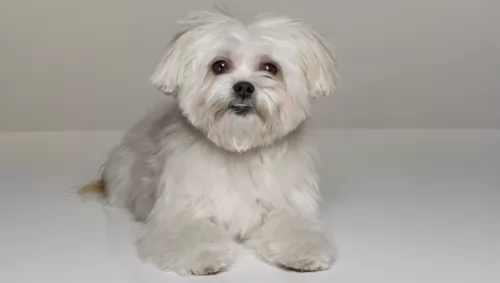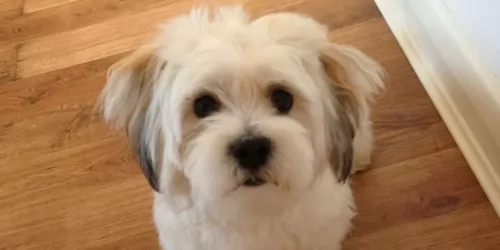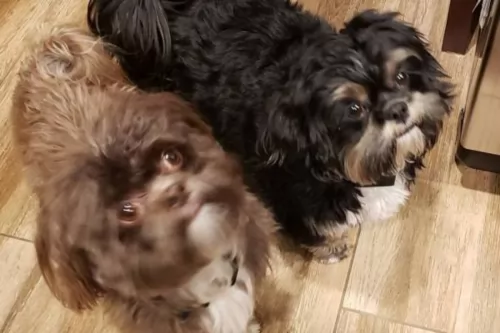 Petzlover
Petzlover Kyi-Leo is originated from United States but Leonberger is originated from Germany. Kyi-Leo may grow 50 cm / 19 inches shorter than Leonberger. Kyi-Leo may weigh 71 kg / 156 pounds lesser than Leonberger. Kyi-Leo may live 5 years more than Leonberger. Kyi-Leo may have less litter size than Leonberger. Both Kyi-Leo and Leonberger requires Moderate Maintenance.
Kyi-Leo is originated from United States but Leonberger is originated from Germany. Kyi-Leo may grow 50 cm / 19 inches shorter than Leonberger. Kyi-Leo may weigh 71 kg / 156 pounds lesser than Leonberger. Kyi-Leo may live 5 years more than Leonberger. Kyi-Leo may have less litter size than Leonberger. Both Kyi-Leo and Leonberger requires Moderate Maintenance.
 The Kyi-Leo first came about in the 1950s in San Francisco, USA, with the crossing of two dog breeds – the Lhasa Apso and the Maltese.
The Kyi-Leo first came about in the 1950s in San Francisco, USA, with the crossing of two dog breeds – the Lhasa Apso and the Maltese.
Because this is a mixed-breed dog, it isn’t recognized by the American Kennel Club, but it is recognized by some of the other dog associations such as the American Rare Breed Association or ARBA as it is known. Today the dog is looked upon as a designer breed.
 Hailing from Germany, and more specifically the city of Leonberg, the Leonberger is a giant dog breed.
Hailing from Germany, and more specifically the city of Leonberg, the Leonberger is a giant dog breed.
A resident of Leonberg, Germany, was looking to develop a dog that resembled a lion and in 1846 it was announced that such a dog had been developed by crossing a Newfoundland, Saint Bernard and Pyrenean Mountain dog.
It was after 2010, when the Leonberger Club of America joined the American Kennel Club, that the strict breeding rules were no longer mandatory for all Leonbergers.
 The Kyi-Leo is a small dog standing at 20 – 30cm in height and weighing in the region of 4 – 6kg.
The Kyi-Leo is a small dog standing at 20 – 30cm in height and weighing in the region of 4 – 6kg.
He has a long, silky coat which is essentially black and white or grey/silver and white or even gold and white. He has frail legs which can become injured or broken in vigorous rough and tumble games.
You can certainly describe the Kyi-Leo as a sweet, quiet, non-aggessive playful dog, and for anyone who wants a splendid pet and companion, this dog makes a great family pet and he won’t cost you an arm and a leg to feed either.
He also has an acute sense of hearing and this turns him into an excellent ‘alarm’ watch-dog. It is also a dog, that while he will love to join you on a walk, he isn’t a dog that is going to demand a lot of exercise.
He responds well to his human family, is easy-going and gentle, tending to be cautious around strangers. You can trust him to be an awesome playmate for children. In this instance, it’s the children who should be warned when playing with a dog like this as, because of his fragile build, he could easily be injured by children who haven’t been taught to respect animals.
Even though he is such an amicable pet, it will still be of benefit to you and him to have him trained and socialized. Then he responds well to basic commands such as sit, stay and lie-down.
Dogs who spend time with their family, pick up on the ‘culture’ of the family and they learn how to behave. Dogs who are left on their own and never socialized can become nervous and aggressive towards people as they never got to learn how to behave – they weren’t socialized.
 As a giant breed, the Leonberger stands at between 65cm and 80cm in height. He weighs a hefty 40 – 77kg both males and females.
As a giant breed, the Leonberger stands at between 65cm and 80cm in height. He weighs a hefty 40 – 77kg both males and females.
These dogs are described as being dimorphic. It means that there is quite a difference in the looks of the males and females, with the male dogs being heftier and larger than the females.
The head of the dog is large, he has almond-shaped, dark brown eyes and the ears are medium sized and floppy. The tail is long and he has webbed feet which makes him a good swimmer too.
The thick, double coat can be straight or wavy and comes in different colors such as reddish-brown, tan, sandy or yellowish and the hairs can be tipped with black. He sheds quite a bit so will need regular brushing.
The Leonberger can have between 6 – 14 puppies and these puppies are like big, fat, cuddly, fluffy teddy bears. Don’t be tempted to just buy one because of his wonderful looks because they turn out to be huge dogs that eat a lot and the coat can take quite a bit of effort to keep groomed.
Fondly referred to as the Leo, this giant beautiful dog is social and in spite of his size, he should never be left alone in the backyard for long periods of time. He needs to come indoors from time to time to enjoy some interaction with his human family.
He is a family dog, and with training and socialization, he becomes a well-rounded, confident, obedient pet, quiet and content and sensitive to his owner’s moods.
Even though he becomes a great family pet, you need to think twice before you decide to own one of these large dogs as he can be costly to feed.
 The Kyi-Leo is everything you want in a family companion – active, playful, loving, gentle, happy and balanced.
The Kyi-Leo is everything you want in a family companion – active, playful, loving, gentle, happy and balanced.
He loves his human family but tends to be a little bit wary around strangers, gradually warming to them.
He may be small, but he is robust and alert, and he is also capable of making you a good watchdog.
The Kyi-Leo is an all-round great little pet to have.
 Don’t be deceived by the looks of the big Leonberger because he isn’t aggressive, but quiet and calm. Large he may be, but he isn’t sluggish either and he will certainly require exercise such as a long, fairly lively walk every day.
Don’t be deceived by the looks of the big Leonberger because he isn’t aggressive, but quiet and calm. Large he may be, but he isn’t sluggish either and he will certainly require exercise such as a long, fairly lively walk every day.
They’re intelligent dogs too and respond well to socialization and training. He is a social dog and wants to enjoy plenty of interaction with his human family members.
These dogs are often used as rescue- and therapy dogs as they are so loving and sensitive. Give him lots of love and good care and you’re going to have the most wonderful pet that lives up to the saying – dogs are man’s best friend.
 Your Kyi-Leo is such a feisty, robust little dog who is not likely to cost you much in terms of health care. With his frail legs, it is a good thing to know that you need to be careful with him in terms of back-and joint problems.
Your Kyi-Leo is such a feisty, robust little dog who is not likely to cost you much in terms of health care. With his frail legs, it is a good thing to know that you need to be careful with him in terms of back-and joint problems.
There are actually knee joint issues which are fairly common in small dogs, one of which is patellar luxation.
This is where the kneecap pops out of the thighbone, causing the dog to skip or hop. Some joint issues are genetic and may require surgery. Make sure to keep your pet’s weight under control to remove additional stress on the joints.
This is another dog illness you want to be careful with. Acute pancreatitis -inflammation - is when the condition comes on suddenly while chronic pancreatitis is when pancreatitis occurs over a period of time.
With acute pancreatitis in dogs you’ll see symptoms such as vomiting, abdominal pain, tremors and reluctance to eat. Pancreatitis can be brought on by too much fat, especially rancid fat, some anti-biotics, a low protein diet or a sickness such as diabetes.
If you suspect pancreatitis in your dog, get him as quickly as possible to the vet.
 Leonbergers are strong, generally healthy dogs. It is said that very large dogs like this don’t live as long as smaller dogs and they also face more health issues. Orthopedic issues such as hip dysplasia are more common with large breeds.
Leonbergers are strong, generally healthy dogs. It is said that very large dogs like this don’t live as long as smaller dogs and they also face more health issues. Orthopedic issues such as hip dysplasia are more common with large breeds.
An orthopedic problem like this is a misalignment of a joint. This large dog also tends to develop elbow dysplasia too. Fortunately today, hip- and elbow dysplasia is controlled because of efforts of breeders to have their Leonbergers screened.
Nonetheless it is important to know about this ailment. The word ‘Dysplasia’ is referring to an abnormality of development. With both hip- and elbow dysplasia, there is abnormal development of the joints, and osteoarthritis can build up, causing lameness for your giant canine.
Cancer is sadly a leading cause of death in dogs over the age of 10 years. Lymphoma is a blood-related cancer – a tumor of the lymph nodes. Dogs can develop different forms of lymphoma. The warning signs are a lump or a wound that won’t heal, swelling in the bone and abnormal bleeding.
Luckily cancer is very treatable in dogs, but you need to get your dog to the vet as soon as possible.
 The Kyi-Leo doesn’t require vigorous exercising. One walk a day will keep them happy. There are pet owners who believe dogs can be permanently outside dogs where they can do their own exercise.
The Kyi-Leo doesn’t require vigorous exercising. One walk a day will keep them happy. There are pet owners who believe dogs can be permanently outside dogs where they can do their own exercise.
Everybody who knows dogs, knows they are social creatures who will simply lie at your backdoor just waiting for some response from their beloved human family. Every dog, regardless of breed or size, needs exercise and interaction with their humans every day.
Dogs left alone in the yard day after day are loney, frustrated and bored, and when they start digging or barking, irresponsible owners will ill treat them. These kind of people should never own a dog.
The Kyi-Leo has a sensitive stomach so he’ll need good quality food to avoid digestive problems. Ideally home-cooked food such as softly boiled chicken, brown rice and raw or cooked vegetables added into top quality kibble is the preferred diet.
Fresh, cool water needs to be constantly available.
Brush the long, silky coat at least twice a week to ensure it remains free of knotting. Brushing keeps the coat shiny too.
As a long eared dog, ears should be checked and cleaned regularly too. Air doesn’t reach the inside of their ears and the warm dampness in the ears are a breeding place for infection.
Nails should also be trimmed when they become long because left uncut they can hook onto things causing injury ad pain.
Small dogs are more prone to tartar formation and loss of teeth. You’ll notice that something isn’t right because your lively little dog will be lethargic, he may not want to eat his food and his face may be swollen. When you suspect dental problems, get him to the vet.
 That long coat of the Leonberger is going to require some brushing at least twice a week. He is also a moderate shedder and you want to get rid of all that loose hair and to keep him looking well groomed.
That long coat of the Leonberger is going to require some brushing at least twice a week. He is also a moderate shedder and you want to get rid of all that loose hair and to keep him looking well groomed.
A proper, nutritious diet is an essential part of having healthy, happy dogs and if you’re unsure about how to feed your giant pet, speak to your veterinarian.
The best diet for dogs is always very debatable, but essentially it needs to be kept simple. Try and invest in the very best commercially manufactured dog food for large breeds. Every dog wants a tasty home-made morsel from time to time. Add in cooked chicken, brown rice as well as cooked or raw vegetables. Raw meat can also be added in from time to time.
You want to avoid feeding the Leonberger puppy a high protein diet as this encourages rapid growth and you want to avoid that.